From June 19 to 20 and 23, 2025, the first consultation sessions for the Global Food Systems and SDGs Report were successfully convened. Focused on the report’s preface and first chapter, the meetings were organized by the World Shiology Forum (WSF) Secretariat and featured nine dedicated sessions, bringing together over 50 experts and scholars from more than 40 countries to enhance the report’s academic rigor and global perspective. Their insights will contribute to refining this pivotal report concerning global food systems development.
The meetings were chaired by Mr. Yan Sheng, Secretary-General of the World Shiology Forum, with participants engaging in vibrant discussions on the report’s content. The Secretariat carefully documented all feedback, and the drafting team will conduct further research to refine the report based on Shiology theory and practical problem-solving principles.
Due to time zone differences, experts from the U.S., Canada, Germany, France, Belgium, Switzerland, Sweden, Portugal, Colombia, Uruguay, Israel, Rwanda, Botswana, and other regions who could not attend panel discussions participated in one-on-one meetings. They expressed strong support for the report’s current framework while offering suggestions for further refinement. These experts also engaged in in-depth discussions on the practical application of the Shiology theoretical framework in their respective countries and regions, as well as potential collaborations such as establishing the Research Center for Shiology.
Key Expert Recommendations:
Structure & Formatting
1.Add an executive summary/highlights section.
2.Standardize hierarchical section numbering.
3.Refine headings and realign core objectives.
4.Enhance models and adjust national classification units.
5.Clarify the report’s unique value and expert selection criteria.
6.Include references, "Nutrition & Health" module, and food system framework diagrams.
7.Optimize terminology with explanatory footnotes (e.g., defining "Food Order").
8.Standardize methodology subheadings and improve chapter logic.
Data Sourcing & Statistical Mechanisms
1.Address gaps in international data (e.g., non-formal food sources, accessibility barriers in developing economies).
2.Add visual summaries linking data collection to solutions.
3.Mandate source attribution and establish national verification tools.
4.Develop dynamic assessment protocols for missing baseline data.
5.Create regionally differentiated benchmarks for vulnerable groups.
Content Expansion
1.Equity & Inclusion: Incorporate gender equality metrics and quantify global nutrition disparities.
2.Health & Nutrition: Address special population needs and warn ultra-processed food risks.
3.Climate & Ecology: Integrate 1.5°C warming impacts and water governance strategies.
4.Regional Nuances: Understore geographical challenges through segmented analysis by geographical and cultural/dietary zoning.
Policy & Governance
1.Prioritize national food security in trade policies while supporting local industries.
2.Legislate school meal standards and incentivize public procurement of local organic produce.
3.Reform subsidies drawing on China’s experience, strengthening consumer policies.
Technology & Education
1.Establish industry-academia platforms to accelerate tech transfer.
2.Embed food systems education in global curricula with practical modules.
Cultural & Biodiversity Preservation
1.Develop a global traditional recipes database.
2.Promote geographical indication certifications and document wild edible plants.
Implementation Mechanisms
1.Ensure transparent case selection and pilot project integration.
2.Create national food system data dashboards.
3.Facilitate cross-sectoral collaboration.
Regional Priorities
1.Deepen engagement of SIDS (Small Island Developing States) experts.
2.Conduct field research in Africa with low-cost data tools.
Moving forward, the WSF Secretariat will continue collecting expert feedback in phases. It plans to send Chapters 2 to 6 of the report to experts on July 7, followed by Chapters 7 to 10 on July 15, to solicit further revision suggestions from experts worldwide. Meanwhile, the Secretariat is actively preparing for an online consultation meeting scheduled for July, aiming to gather broad expert input to further enhance the report’s professional quality and international recognition.
The successful convening of this consultation has laid a solid foundation for improving the Global Food Systems Issues and SDGs Report. With the joint efforts of experts around the world, the report is expected to gain greater academic depth and global perspective, providing valuable guidance for addressing numerous challenges in the global food systems domain.
Experts Participating in Each Session (Sort by Number of Sessions Attended)
Session One:
Soumaya Zaddem, Tunisia, African Center for Resilient Agriculture (ACRA) – Founder & Lead Consultant
Viliami T Manu, Kingdom of Tonga, Ministry of Agriculture, Food & Forestry – Chief Executive Officer
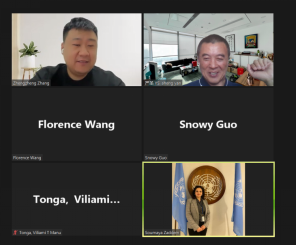
Session Two:
David Oscar Yawson, Barbados, University of the West Indies at Cave Hill, CERMES – Director
Ali Yassoralipour, Iran, Universiti Tunku Abdul Rahman (UTAR) – Assistant Professor
Lourdes Noemí Guacho Sáez, Ecuador, World Vision Ecuador – Child and Adolescent Development Promoter
Emma Sarahi Navarro Roque, Honduras, Consultant – (Consultant for Women Producers’ Projects
Glenda Adabel Cano Arriola, Honduras, Consultant – Socioeconomic and Planning Analyst
Hilda Ruth Navarro Roque, Honduras, Forestry Technician
Wesly Aníbal Curruchich Chali, Guatemala, Bayer S.A. – Associate Senior Breeding Operation
Sri Fatimah, Indonesia, University of Padjadjaran, Faculty of Agriculture – Associate Professor
Leroy Lopez, Belize, Texas A&M University – PhD Student
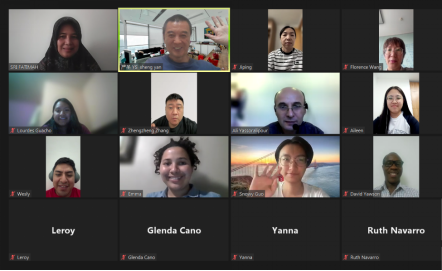
Session Three:
Fotima Saydullaeva, Uzbekistan,Senior Teacher, Samarkand Agroinnovations and Research University
Rudra Bahadur Shrestha, Nepal, Purbanchal University – Visiting Professor
Maryia Samakhavets, Belarus, Polessky State University – Associate Professor
Muhammad Farooq, Oman, Sultan Qaboos University – Head, Department of Plant Sciences
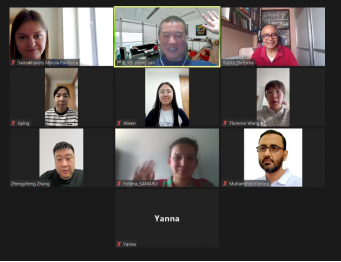
Session Four:
Dalia Hussein Mohamed Eldardiry, Saudi Arabia, Imam Abdulrahman Bin Faisal University – Associate Professor, College of Design, IAU
Kaldeep Kumar Oad, Pakistan, M.Phil Scholar – Rural Development,Faculty of Agricultural Social Sciences,Sindh Agriculture University
Steven J. Wearne, United Kingdom, SJW Consultancy – Independent Consultant
Damyan Kirechev, Bulgaria, University of Economics – Varna – Chief Assistant Professor
David Ben Otieno Matinde, Kenya, Free Lunch for Children International – Social Development Director
Fred Oluoch Jienda, Kenya, Office of the President of Kenya – Senior Program Officer
Anvar Kodirov, Tajikistan, National Academy of Sciences of Tajikistan, Center for Innovative Development of Science and New Technologies – Director
Emeliane Kiladze, Georgia, Agricultural University of Georgia – Researcher
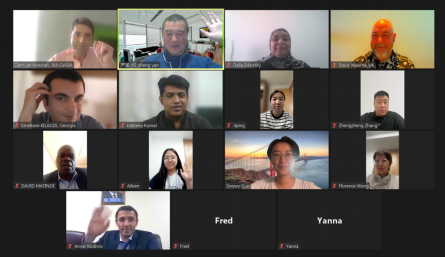
Session Five:
Diane Dodd, Spain, International Institute of Gastronomy, Culture, Arts and Tourism (IGCAT) – President/Founder
Edith ShivasI GCAT Vice President (Tourism Expert) accompanied the meeting.
Alicia Paulina Cárdenas Castro, Mexico, Instituto Tecnológico de Durango (Technological Institute of Durango, National Technological Institute of Mexico) – Postdoctoral Researcher
Sonia Guadalupe Sáyago Ayerdi, Mexico, Tecnológico Nacional de México / Instituto Tecnológico de Tepic – Professor
Adrian Spence, Jamaica, University of the West Indies, Mona Campus, International Centre for Environmental and Nuclear Sciences – Senior Research Scientist
Lubica Bartová, Slovak Republic, Slovak University of Agriculture in Nitra, Faculty of Economics and Management – Full Professor
Sangay Dema, Bhutan, (Independent) – Researcher (Botanist)
Jeancy Ntuka Luta, Democratic Republic of the Congo, University of Kinshasa, Centre for Research in Soil Science – Soil Scientist
Truong Thi Thu Trang, Vietnam, Institute of Strategy and Policy on Agriculture and Environment – Vice Director General
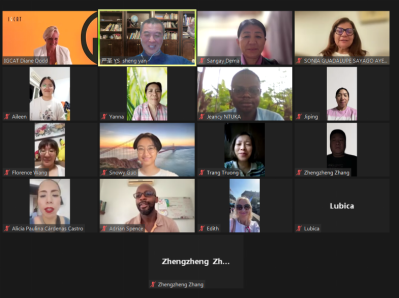
Session Six:
Philip Sagero, Fiji, The University of the South Pacific – Lecturer of Physical Geography
Delfim da Costa, Timor-Leste, Universidade Nacional Timor Lorosa’e – Senior Lecturer
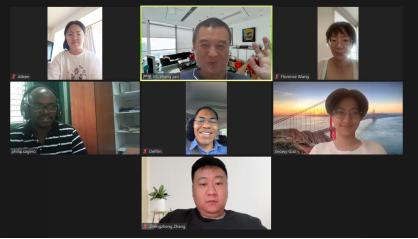
Session Seven:
Hong Shyang Pei, Brunei Darussalam, Universiti Teknologi Brunei – Assistant Professor
Alessandra Guidi, Italy, University of Pisa, Department of Veterinary Sciences – Full Professor
Ebrima Jarra, The Gambia, The Soil Solution (NGO) – Executive Director
Ying Ping Chang, , Malaysia, Universiti Tunku Abdul Rahman (UTAR) – Associate Professor
Ashley Rukudzo Kavumbura, Zimbabwe, Ash-Gric – Founding Director
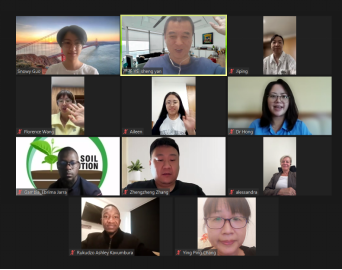
Session Eight:
Victor Ongoma, Morocco, Mohammed VI Polytechnic University – Assistant Professor of Climate Change Adaptation
Islam H. Elghonaimy, Bahrain, University of Bahrain, College of Engineering – Postgraduate Studies Coordinator
Iulia Dragut, Romania, Cultural Association EuroEast – Alternative – President
Vesna Mrdalj, Bosnia and Herzegovina, University of Banja Luka – Head, Dept. of Agricultural Economics and Rural Development
Eugenia Lucașenco, Republic of Moldova, Academy of Economic Studies of Moldova, National Institute for Economic Research – Head of Agri-food Economics and Rural Development Department
Margaret Camilleri Fenech, Malta, University of Malta – Lecturer
Alma Harašić Bremec, Croatia, Association of Chefs from Mediterranean and EuropeanRegions – Culinary Academy Manager
Christina A. Gabrillo, Philippines, Visayas State University – Professor
Shukulani Georgia Nyirenda, Malawi, National Youth Network on Climate Change and Agriculture – Project Officer
Francisco Fernando Mabjaia, Mozambique, Agricultural professional & Farm Manager)
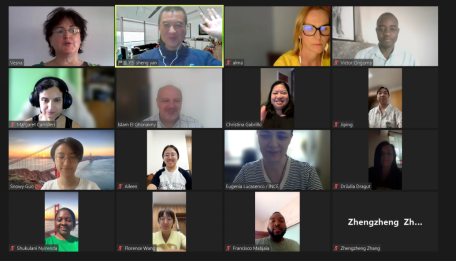
Session Nine:
Marjana Gurinovic (Serbia, PhD Nutrition, Senior research advisory, Capacity Development in Nutrition (CAPNUTRA) – Chair)
Jelena Milešević, Serbia, Institute for Medical Research, University of Belgrade – Senior Scientific Associate
Hossein Azadi, Belgium, University of Liège – Professor
Eugenia Serova, Russia, Higher School of Economics – Professor
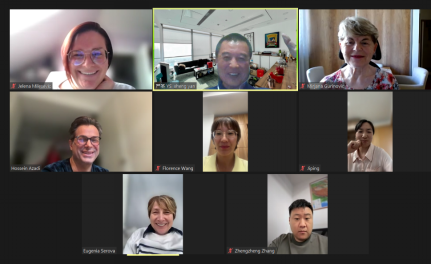
Contact Person: Mr Zhang E-mail: Secretariat@shiology.world